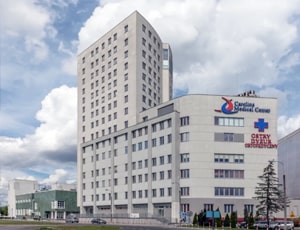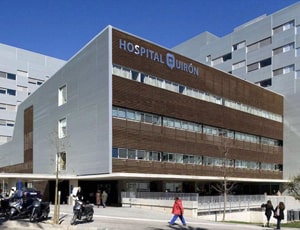Total knee replacement, also known as Total knee arthroplasty. It is a surgical procedure in which a damaged or diseased knee joint is replaced with an artificial joint or prosthesis. This procedure is typically performed to alleviate pain and improve the function of the knee when conservative treatments have been unsuccessful.
Total knee replacement surgery is generally effective in relieving pain and improving the quality of life for individuals with severe knee joint problems.
A bilateral knee replacement surgery is performed when both knees are damaged or diseased. If only one knee is affected, then the surgeon recommends the patient undergo the replacement of just one knee, a procedure known as unilateral knee replacement surgery.
Knee replacement surgery, like any medical procedure, comes with certain risks. These potential risks include:
It's important for individuals considering knee replacement surgery to be aware of these potential risks and discuss them thoroughly with their healthcare team. Despite the risks, many people undergo knee replacement surgery successfully, experiencing significant improvements in pain relief and mobility.
Before bilateral knee replacement surgery, the surgeon may conduct a series of diagnostic tests to check for your overall fitness. The following tests are performed:
These diagnostic tests help the healthcare team understand the patient's overall health, identify potential risks, and tailor the surgical approach to the individual's specific needs. The results guide the orthopedic surgeon in planning and performing a successful bilateral knee replacement surgery while minimizing potential complications.
You may also be advised to perform a few exercises to strengthen the muscles of your knee and legs. This helps ensure faster and easier recovery. You are advised to talk to your surgeon and a few of his patients to set expectations for the procedure. You should be aware of the approximate knee replacement recovery time and the amount of pain that you are likely to experience.
You will be told not to eat or drink anything at least six to 12 hours before the surgery. If needed, your surgeon will conduct an arthroscopic examination of your knee to see the extent of damage and devise a surgical approach that best suits your condition.
Bilateral knee replacement surgery can be approached in two ways: either both knees are addressed in a single surgery or each knee is operated on separately in distinct procedures. Opting for simultaneous surgery is often favored for younger patients with overall good health. In contrast, individual surgeries may be recommended, with a gap of a few hours to days between them.
Administration of Anesthesia: In the course of bilateral knee replacement surgery, patients are administered either general anesthesia for unconsciousness or spinal anesthesia to induce numbness. The knee is then accessed, either through an open incision or a small one in the case of minimally invasive procedures.
Type of Knee Implants: The surgical process involves the removal of the kneecap and the extraction of damaged or diseased knee components. These are substituted with implants crafted from metal, plastic, or ceramic materials, chosen based on the surgeon's assessment. The fixation of implants can be cemented or cementless, and the incision is meticulously closed using stitches. This comprehensive approach aims to restore knee function and alleviate discomfort, promoting a smoother recovery for individuals undergoing bilateral knee replacement surgery.
Typically lasting between 1 to 2 hours, knee replacement surgery involves a series of precise steps by the surgeon. This includes making a strategic incision over the knee, skillfully removing diseased and damaged bone and cartilage while preserving healthy bone, and finally, expertly implanting replacement components into the thighbone, shinbone, and kneecap. This meticulous process aims to restore function and alleviate pain, paving the way for improved mobility and quality of life.
Bilateral knee replacement surgery is a major procedure and therefore, recovery may take time. You are likely to experience pain for the initial few weeks. However, it goes away gradually as you start performing physical exercises recommended by the doctor.
You should keep your wound dry and clean to prevent infection after the surgery. In addition, you should elevate your leg often for reduced pain. Talk to your surgeon if you experience redness, swelling, or inflammation around the knee.

Kyrgyzstan
Ms. Bobylev Lyudmila Underwent Robotic Double Knee Replacement Surgery in India Read Full Story

Singapore, Singapore
Mount Elizabeth Hospital is a multispecialty healthcare facility operated by Parkway Health. The hos...more
![]() Private Driver / Limousine Services
Private Driver / Limousine Services
![]() International Cuisine
International Cuisine
![]() Phone in Room
Phone in Room
![]() Online Doctor Consultation
Online Doctor Consultation

Warsaw, Poland
History Carolina Medical Center is one of the best and clinically advanced orthopedics and sports m...more
![]() Airport Transfer
Airport Transfer
![]() Choice of Meals
Choice of Meals
![]() Interpreter
Interpreter
![]() SIM
SIM

Barcelona, Spain
Quironsalud Barcelona Hospital is built at a very convenient location in Barcelona. The hospital is ...more
![]() Airport Transfer
Airport Transfer
![]() Choice of Meals
Choice of Meals
![]() Interpreter
Interpreter
![]() SIM
SIM

Musculoskeletal Oncology
Delhi, India
10 Years of experience
USD 30 for video consultation

Orthopaedics & Joint Replacement Surgeon
Ulus, Turkey
22 Years of experience
USD 240 for video consultation

Orthopedic Surgeon
Hyderabad, India
5 of experience
USD 30 for video consultation

Orthopedics & Joint Replacement Surgeon
Hyderabad, India
22 of experience
USD 30 for video consultation
Q. What is the time duration of the bilateral knee replacement surgery?
A. The surgery may take 1-3 hours to complete if a single knee is operated. Both the knees take four to five hours time.
Q. For how long should I use the bandage after surgery?
A. The bandage can be used for one week until the wound is dry and should be changed daily with a new dry sterile gauze.
Q. What are the uses of knee replacement surgery?
A. Knee replacement surgery eases pain and increases the joint mobility without causing pain and discomfort.
Q. Is any special equipment required after surgery?
A. A CPM machine might be required for the first few days after surgery to increase the range of motion. The mobility devices like crutches and walkers can be used.
Q. Can I resume to my daily activities like before?
A. Normal daily activities can be done along muscle strengthening exercises. Running, jumping, and bicycling should be avoided.